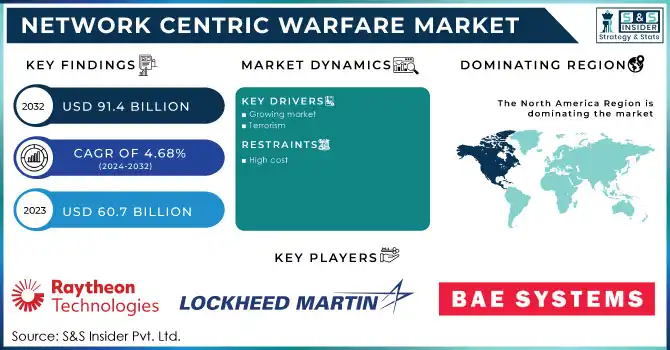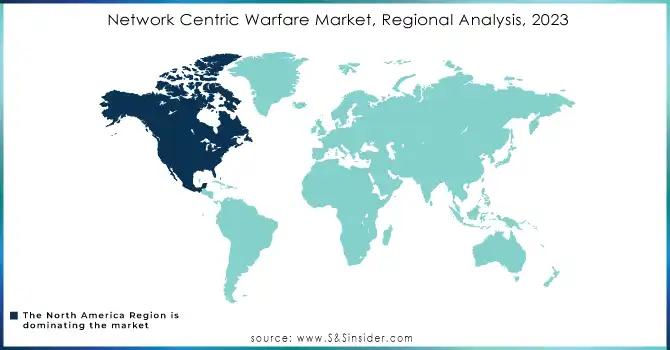Network Centric Warfare Market Report Scope & Overview:

To get more information on Network Centric Warfare Market - Request Free Sample Report
The Network Centric Warfare Market Size was valued at USD 60.7 billion in 2023 and is expected to reach USD 91.4 billion by 2032 and grow at a CAGR of 4.68% over the forecast period 2024-2032.
Network-centric warfare focuses on strategic frequency domination and is easily integrated into modern warfare. It also includes fifth-generation warfare, which takes place in cyberspace and is used to prevent cyber-attacks and data breaches, as well as national defense. Aeronautical, defense, and security groups utilize advanced technologies in many areas across the world to detect real and potential threats. The use of electromagnetic energy in monitoring, influencing, diminishing, or blocking hostile use of the electromagnetic radiation, as well as the detection of an approaching missile's radar and the collecting of radio communications from an opponent, is known as network-centric warfare.
MARKET DYNAMICS
KEY DRIVERS
-
Growing market
-
Terrorism
RESTRAINTS
-
High cost
OPPORTUNITIES
-
Global growth
CHALLENGES
-
Cyberattack
-
Data breaches
IMPACT OF COVID-19
Even as the COVID-19 crisis causes challenges across sectors and a drop in high technology investment, tech companies are increasing their focus on high-demand products and seeking new ways to service their customers.
Real-time information is also essential to protect national boundaries. Even in pandemic scenarios, the emergence of network-centric warfare helps compensate for the demand for intelligence, surveillance, and recognition (ISR) capabilities.
Artificial intelligence (AI), virtual reality (VR), and augmented reality (AR) solutions are expected to play a crucial role in adjusting to the COVID-19 pandemic and tackling ever-changing issues. Such technologies might also be remotely operated and used to monitor future threats in order to respond automatically.
KEY MARKET SEGMENTATION
By Platform
-
Land-based
-
Unmanned
-
Naval-based
-
Air-based
By Application
-
ISR (intelligence, surveillance, and reconnaissance)
-
Communications
-
Computers
-
Combat
-
Cyber
By Architecture
-
Hardware
-
Software
By Communication Network
-
Wireless
-
Wired
By Mission Type
-
Tactical
-
Strategic
REGIONAL ANALYSIS
In 2022, the Network Centric Warfare Market is predicted to be led by North America, followed by Europe. During the forecast period, Asia-Pacific is expected to develop at the fastest CAGR. Rising demand for technologically superior defense equipment in the digital age, as well as an increase in networked UAVs used by emerging countries for border monitoring, are driving the expansion of this market. Recent improvements in emerging countries' defense budgets for technologically superior marine, land, and air defense equipment, on the other hand, are likely to boost the market in the area.

Need any customization research on Network Centric Warfare Market - Enquiry Now
REGIONAL COVERAGE
North America
-
USA
-
Canada
-
Mexico
Europe
-
Germany
-
UK
-
France
-
Italy
-
Spain
-
The Netherlands
-
Rest of Europe
Asia-Pacific
-
Japan
-
South Korea
-
China
-
India
-
Australia
-
Rest of Asia-Pacific
The Middle East & Africa
-
Israel
-
UAE
-
South Africa
-
Rest of Middle East & Africa
Latin America
-
Brazil
-
Argentina
-
Rest of Latin America
Key Players
The Key Players are Lockheed Martin Corporation, Elbit Systems, Cisco Systems, Rockwell Collins, Thales Group, Northrop Grumann Corporation, General Dynamics Corporation, Raytheon Company, Airbus Group N.V., L-3 Communications Holdings, Bae Systems PLC, Harris Corporation & Other Players.
| Report Attributes | Details |
|---|---|
| Market Size in 2023 | USD 60.7 Billion |
| Market Size by 2032 | USD 91.46 Billion |
| CAGR | CAGR of 4.6% From 2024 to 2032 |
| Base Year | 2023 |
| Forecast Period | 2024-2032 |
| Historical Data | 2020-2022 |
| Report Scope & Coverage | Market Size, Segments Analysis, Competitive Landscape, Regional Analysis, DROC & SWOT Analysis, Forecast Outlook |
| Key Segments | • By Platform (Land-based, Unmanned, Naval-based, Air-based) • By Application (ISR (intelligence, surveillance and reconnaissance), Communications, Command and Control, Computers, Combat, Cyber, Electronic Warfare) • By Architecture (Hardware, Software) • By Communication Network (Wireless, Wired) • By Mission Type (Tactical, Strategic) |
| Regional Analysis/Coverage | North America (USA, Canada, Mexico), Europe (Germany, UK, France, Italy, Spain, Netherlands, Rest of Europe), Asia-Pacific (Japan, South Korea, China, India, Australia, Rest of Asia-Pacific), The Middle East & Africa (Israel, UAE, South Africa, Rest of Middle East & Africa), Latin America (Brazil, Argentina, Rest of Latin America) |
| Company Profiles | Lockheed Martin Corporation, Elbit Systems, Cisco Systems, Rockwell Collins, Thales Group, Northrop Grumann Corporation, General Dynamics Corporation, Raytheon Company, Airbus Group N.V., L-3 Communications Holdings, Bae Systems PLC, Harris Corporation. |
| DRIVERS | • Growing market • Terrorism |
| RESTRAINTS | • High cost |

